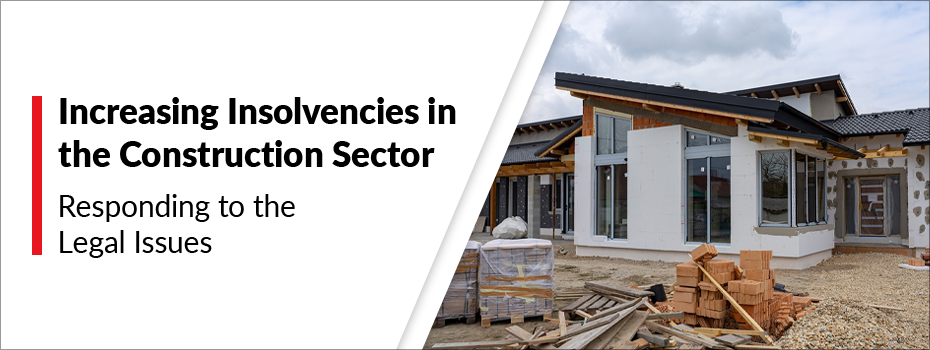
Responding to the legal issues of increasing insolvencies in the construction sector
28 September 2023 07:30
The significant spike in insolvencies in the construction sector in Australia has caused a number of issues for owners of properties under construction. The contract disputes for unfilled contracts bring to light a number of issues in the law, particularly regarding owner’s rights under contract law. This is a vital, growing area of the law, so a deep understanding of it is key.
This article comes from Tom Read, our expert Legal Writer for Practical Guidance Insolvency & Restructuring.
Background
In the 12 months to August, there were 2,398 insolvencies in the construction sector, accounting for 29% of all insolvencies, and a startling 55% increase on the same period last year.[1]
Melbourne-based home builder Porter Davis heads a list of companies in the sector to fall into insolvency in recent times. Others include Probuild, Rescon Granny Flats and Mahercorp.
Builder insolvencies leave owners to pick up the pieces with the construction part done, often scrambling to find a new builder, invariably at increased cost. As the fallout in the construction sector shows no signs of abating, we take a look at key legal issues faced by owners when a builder becomes insolvent.
Key issues for an owner in a builder insolvency
Apart from the obvious question as to who is to complete the work, key contractual issues faced by owners upon their builder entering a form of external administration are:
- Claims the owner has or may in the future have against the builder e.g., for return of the deposit, in respect of defects, delay and non-completion of the work.
- Claims the builder has against the owner including payment claims under security of payment legislation.
- Set-off rights of the parties.
- Rights of the owner under “take-out” clauses to complete works (not usually relevant for domestic building contracts).
- The owner’s entitlement to terminate the contract.
- If the owner holds security (e.g., an unconditional guarantee or retention), rights to call on it (security is not usually given by a builder under a domestic building contract).
These issues need to be considered in light of provisions of the Corporations Act 2001 (Cth) and the Personal Property Securities Act 2009 (PPSA).
When a builder enters external administration, what are the first steps?
Firstly, information needs to be obtained by the owner about the form of external administration. The builder may have been wound up, entered voluntary administration or small business restructuring or had a receiver appointed.
Initial information sent to creditors can be obtained from the external administrator or by undertaking an ASIC company search.
Owners should also ensure that the external administrator has a record of the owner’s debt or claim.
What can be done about recovering the owner’s claims against the builder?
Liquidation
If a company is wound up in insolvency (whether court-ordered or voluntary winding up), an owner cannot start or continue with proceedings to recover against the builder without leave of the Court.
Debts and claims of owners of the type mentioned above are pursued under a proof of debt process and converted to an entitlement to dividends in the liquidation. However, personal guarantees (if any are given, and usually they are not) can be enforced.
If owners hold a bank guarantee as security, they are free to call on it if the contract permits.
However, a retention account may constitute a security interest under the PPSA and must have been registered on the Personal Property Securities Register (PPSR). Failure to do so results in loss of the security. Similarly, the owner’s right to a builder’s goods and equipment as part of take-out rights may also constitute a security interest that is at risk for non-registration. Security interests are also subject to the usual priority rules where there is a competing interest.
Voluntary administration
Once administrators are appointed, an owner cannot start or continue with proceedings against the company without leave of the Court.
Owners, as unsecured creditors, get to vote on any deed of company arrangement (DOCA) proposed. If a DOCA is approved by creditors, the owner’s claims are dealt with under a proof of debt process.
If no DOCA is approved, the builder will usually transition to a winding up, and claims are dealt with in the winding up.
During the period of voluntary administration, any personal guarantees given by the builder’s directors and their spouses or relatives cannot be enforced without leave of the court.
In this period so-called “ipso facto” clauses building contracts, which would otherwise allow a party to exercise contractual rights (e.g., termination) if another party experiences a specified insolvency event, cannot be enforced. A stay on the exercise of contractual rights applies where the right arises solely by reason of the voluntary administration, the company’s finance position during the administration or a reason that is in substance contrary to the intention of the stay. For example, an ipso facto clause that gives an owner a right to call on a bank guarantee or terminate the contract upon the appointment of an administrator cannot be exercised. However, the stay does not apply to take-out rights, nor does it apply in the case of contractual rights that arise on defaults relating to performance e.g. defects, delays or non-completion.
Failure to register security interests in respect of retention accounts and rights to the builder’s goods and equipment on the PPSR can result in loss of that security in a voluntary administration.
Small business restructuring
Only certain small builders will qualify for this form of external administration. The ability of an owner to take steps to recover claims against a builder under restructuring is much the same as with voluntary administration.
Instead of executing a DOCA, in small business restructuring a company makes a restructuring plan. There is a similar stay in relation to legal proceedings and enforcement of personal guarantees given by directors and their spouses and relatives, and the ipso facto provisions of the Corporations Act operate. Registration on the PPSR of security interests in respect of retention accounts and rights to goods and equipment is also critical for owners.
Receivership
When a secured creditor, such as a bank, appoints a receiver, there is no stay relating to legal proceedings. However, where the receiver is appointed over all assets, it is often fruitless for an owner to sue as no assets remain to satisfy any judgment that may be obtained.
Personal guarantees given by directors and their spouses or relatives can be enforced in the usual way.
During a receivership, the ipso facto provisions, covered above, operate provided the appointment is in respect of all or substantially all of the company’s assets.
What happens to the building contract?
Most standard form building contracts contain terms allowing an owner to terminate the contract upon the appointment of an external administrator.
However, as noted above, such “ipso facto” clauses cannot be enforced during the period a company is in voluntary administration, restructuring or receivership unless the court orders otherwise. These restrictions do not apply in a liquidation.
Importantly, if the owner has a right to terminate based on the builder’s non-performance or non-payment, the owner is not prevented by the ipso facto provisions from doing so.
For the owner, if a right of termination does exist, for example, if an event of default relates to performance, the decision as to whether to exercise that right will depend on a variety of factors, including the status of building works, the willingness and ability of the builder to proceed, and whether a new builder can step in complete the contract and at what cost.
In most liquidations, it would be expected that building contracts will be terminated, with the owner then having a claim in the liquidation and ranking along with unsecured creditors for a dividend, if any.
However, termination is not inevitable in an external administration. For example, in the recent Mahercorp voluntary administration, many of the building contracts remained on foot. A restructure via a DOCA was approved in May 2023 with most customers agreeing to variations involving price increases, extension of the construction period and extension of the defects liability period.
Claims on domestic building insurance
Domestic building insurance (also known as home warranty insurance) is mandatory in all states except Tasmania (although a new scheme is in development there).
The schemes vary between states. For example, in New South Wales and Victoria, the insurance covers homeowners against financial loss arising from defective or incomplete work by a builder if the builder has become insolvent, died or disappeared.
In contrast, in Queensland, if a builder fails to rectify defective works or complete works, a homeowner may claim against the insurer for financial loss arising even if the builder is not insolvent.
Accordingly, residential owners should check to see whether insurance covers their situation.
What government assistance is available?
The Victorian Government announced a support package to help Victorians affected by the liquidation of Porter Davis and other home builders who went into liquidation between 1 July 2022 and 30 June 2023.
In Tasmania, a one-off payment is also available to the consumers if their builder dies, disappears or becomes insolvent after 1 July 2021.
Government assistance is ad hoc and cannot be relied on by owners. For example, while Victorians got state government support after the Porter Davis liquidation, Queenslanders did not.
Conclusion
Where builders enter forms of external administration, outcomes for owners can vary greatly. Some key tips to consider are:
- Ensure the external administrator has a record of the owner’s claim.
- Consider what rights each party has under the building contract including respective money claims, the owner’s right of “take out”, to terminate the contract and resort to any security provided by the builder.
- Determine how provisions of the Corporations Act and the PPSA affect those rights, e.g., do the ipso facto provisions apply and are there relevant stays that apply to proceedings, some guarantee claims or enforcement of security interests?
- Follow the external administrator’s instructions when it comes to voting at creditor meetings and lodging proofs of debt or claims.
- Finally, for domestic building contracts, investigate whether an insurance claim can be made. It’s worth checking for Government assistance but this is the exception rather than the rule.
Practical Guidance Insolvency and Restructuring is a how-to resource for insolvency and legal practitioners navigating insolvency and restructuring processes. It provides practical resources all in one place for lawyers acting on insolvency & restructuring matters whether for insolvency practitioners, creditors, debtors or company directors.
For subscribers to Practical Guidance Insolvency and Restructuring, for more general guidance on this topic, see Enforcing contractual rights against companies in external administration, which is a how-to resource for insolvency and legal practitioners navigating insolvency and restructuring processes. It focuses on practical issues to support the workflows of lawyers in this area. Provides resources all in one place for lawyers acting on insolvency and restructuring matters whether for insolvency practitioners, creditors, debtors or company directors.
[1] Australian Insolvency Statistics released by ASIC on 26 September 2023 - The first time a company enters external administration or has a controller appointed https://asic.gov.au/regulatory-resources/find-a-document/statistics/insolvency-statistics/insolvency-statistics-current/
Latest Articles
-
 Gayann Walkers is a well-respected Victorian Barrister. Tis interview focuses on what it takes to be a Barrister in sports law, and what the future of the field looks like.
Gayann Walkers is a well-respected Victorian Barrister. Tis interview focuses on what it takes to be a Barrister in sports law, and what the future of the field looks like. -
 The growth of artificial intelligence technologies in Australia has recently come under the spotlight, as the Albanese Government looks to review existing regulatory and governance mechanisms and establish applicable safeguards that are fit for purpose in the current day and age.
The growth of artificial intelligence technologies in Australia has recently come under the spotlight, as the Albanese Government looks to review existing regulatory and governance mechanisms and establish applicable safeguards that are fit for purpose in the current day and age. -
 Artificial Intelligence (AI) is developing fast – but how should it be used? Over the past month, the ethical use and development of AI have been heavily scrutinised as policymakers, intellectuals, and industry leaders debate whether a moratorium should be imposed on AI’s development, or whether AI should be embraced in the name of economic growth.
Artificial Intelligence (AI) is developing fast – but how should it be used? Over the past month, the ethical use and development of AI have been heavily scrutinised as policymakers, intellectuals, and industry leaders debate whether a moratorium should be imposed on AI’s development, or whether AI should be embraced in the name of economic growth.
Practical Guidance
Your one-stop solution for accurate legal answers from Australian legal experts. Tools, practically focused guidance notes, checklists, precedents, and training materials support and streamline your legal workflow.
LEARN MORE LexisNexis
LexisNexis